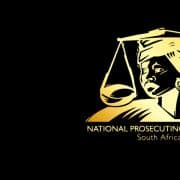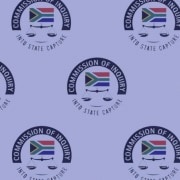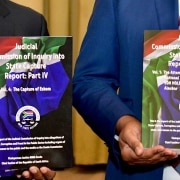|
Getting your Trinity Audio player ready...
|
The Constitutional Court held a special sitting on Wednesday 21 August in honour of Chief Justice Raymond Zondo, who retires at the end of August after serving 27 years on the bench. The event was attended by several dignitaries, including National Assembly speaker Thoko Didiza, Minister of Justice and Constitutional Development Thembi Simelane, and National Director of Public Prosecutions Shamila Batohi, all of whom paid tribute to Zondo.
In his own speech, Zondo spoke of the support he has received from various quarters. “I want to say thank you to this country for being so kind to me. Indeed, South Africa is a country of great possibilities … when I say this country has been good to me, in part it is because over my 27 years on the bench, there is no president of this country who served at least a full term, who did not appoint me to some or other position.
“Being a judge, or any judicial officer, is not a position where anyone should seek to be popular. It is not a position where anyone should seek to always be praised in the media for their judgments. It is a position where what matters should be whether the judgment or the case has been adjudicated in accordance with Constitutional law, without fear, favour, or prejudice. If, as the judiciary we are seen by society and the public as doing exactly that, we will enjoy a lot of confidence of our society.”
Zondo also acknowledged the challenges and achievements in his role as chairperson of the state capture commission. It was in that role that he hoped to have made a notable contribution to better prospects for the country’s governance systems.
“It is my hope that indeed mechanisms will be put in place to make sure that we never have a repeat of state capture, but the question arises, are we putting in place such mechanisms? Prosecutions have their place, and indeed they will contribute, but prosecutions come after the event, they don’t prevent. They will help if those who are thinking of engaging in acts of state capture believe that chances are that they will be caught … if those mechanisms are not there, we will have another state capture.”
Enter more capture-accused MPs
Exactly a week after this occasion, three of the former senior public servants against whom Zondo found prima facie evidence of state capture were sworn in as members of Parliament. The former chief executives of Eskom, Transnet, and the Passenger Rail Agency of South Africa respectively, Brian Molefe, Siyabonga Gama and Lucky Montana took their oaths among the latest members of the MK Party to join the National Assembly.
Except for Montana, the former leaders of state-owned entities (SOEs) have been charged and face criminal charges related to state capture. Molefe’s charges relate to his tenure at Transnet, which came before he moved to Eskom in 2015, making way for Gama to take over the reins at the transport company. The pair have been charged with fraud, corruption, and money-laundering, among others, along with former Transnet executives Anoj Singh and Gary Pita, as well as executives of then Transnet contractor Regiments Capital.
The controversy around the inclusion of the three in Parliament follows a similar situation with former Western Cape High Court judge John Hlophe, another of the MK’s representatives, whose own swearing-in happened in July. More recently, the party removed 15 of its MPs, vacating positions that have now been filled by Molefe, Montana, and Gama, among others. Ten of the 15 fired MPs have launched legal action against the party for its decision. While there have not yet been public pronouncements on what roles the former heads of SOEs will play in Parliament, recently re-appointed party secretary-general Dr Sifiso Maseko said in a TV interview the party will hold off on acting against them until the court process has been completed.
Asbestos case
Another court case that stemmed from state capture investigations is the one of Moroadi Cholota, the former personal assistant of Ace Magashule. Cholota worked in Magashule’s office when the latter was premier of the Free State, and was found by the commission to have played a role in the facilitation of transactions relating to the failed R255-million asbestos eradication contract for which several others have been charged.
Cholota, who has lived in the US for some time while studying there, was first apprehended in April this year, and stayed in custody in that country before being extradited to South Africa in early August. She is charged with fraud and corruption as well as the contravention of the Prevention and Combating of Corrupt Activities Act. The commission found that Cholota had facilitated payments which are thought to be kickbacks from the joint venture (JV) of Diamond Hill Trading and Blackhead Consultants that was awarded the contract. She is currently out on bail of R2 500, granted by the Bloemfontein Magistrates Court, and has failed to get the Free State High Court to declare her extradition and arrest unlawful.
The asbestos case was part of the Free State-focused evidence of the commission, and probed the legitimacy of the contract, which the public protector found in 2020 to have been irregular. By the time the public protector ordered payments in respect of the contract to be stopped, as much as R225-million had already been paid to the JV. While the head of one company in the JV (Diamond Hill), Ignatius Mpambani, was killed in a shooting in Johannesburg in 2017, his partner in the matter, Edwin Sodi – who owns Blackhead Consulting, also implicated in the Hammanskraal cholera tragedy – is among those who are on trial for the matter.
Magashule, who was also arrested in November 2020 on charges similar to those of Cholota, also failed to get the court to dismiss the case against him. He is one of 16 accused in the matter, including both persons and companies. The case is scheduled to commence in April 2025.
Bosasa bonanza
In another matter involving the Bosasa evidence, the NPA’s Asset Forfeiture Unit has successfully seized assets to the value of R53-million from suspects in the Bosasa corruption case. These include two luxury apartments in Italy with an estimated joint value of about R17-million.
Chairperson of the parliamentary Portfolio Committee on Justice and Constitutional Development, Xola Nqola, said: “South Africa has lost millions of rands due to corrupt activities that could have been used for the many challenges that still exist in the country … our people don’t have houses, yet criminals have properties valued at millions, which were likely obtained with money stolen from government.”
Earlier this year, the former head office of the company – which had changed its name to African Global Operations – was sold for around R30-million. Situated in Krugersdorp, Mogale City, it featured substantially in the evidence heard by the commission, particularly from its former COO Angelo Agrizzi, who had fallen out with the Watson family, the company’s original owners. In 2019 Agrizzi told the commission of locations on the property where wads of cash were stored that would be transported to key politicians or public officials on Bosasa’s payroll and who had been instrumental in keeping the company’s government business lucrative.
He would later be arrested in the same year, along with several former colleagues and senior public officials of the Department of Correctional Services, on fraud, corruption, and money-laundering charges.
ANC bigwigs to face music
In keeping with its promise to hold accountable members of its party accused of state capture, the ANC’s integrity commission announced in mid-August that it would put three of them, all members of Parliament, through disciplinary processes.
Malusi Gigaba, David Mahlobo, and Cedric Frolick will face the music, having been asked earlier in the year by the party’s veterans league to remove themselves from the ANC’s parliamentary list ahead of the national election in May. They all declined this request and were sworn in in June.
Zizi Kodwa, who was also in the integrity commission’s sights, resigned from his Cabinet post as minister of sports, arts and culture after his own state capture case made it to court, and subsequently also resigned from his MP post. Gigaba currently serves on the Portfolio Committee on Trade, Industry and Competition, while Frolick went back to his position of house chairperson in the National Assembly, and Mahlobo was appointed to the role of deputy minister of water and sanitation by President Cyril Ramaphosa in July.
Gigaba was implicated by the state capture commission report in interference in the appointment of SOE boards and procurement processes when he was public enterprises minister, while Mahlobo’s name came up in the State Security Agency evidence, where he was accused by several witnesses of facilitating the bribing of judges. Frolick was implicated in receiving gifts and favours from Bosasa in return for facilitating relationships between the company and influential politicians.








